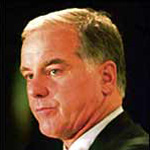By John Briggs
Published March 3rd 2009 in Burlington Free Press
Progressive Bob Kiss narrowly won election to a second term as Burlington mayor Tuesday by edging Republican City Council President Kurt Wright in the third round of instant run-off voting.
The victory was a vindication of the quiet mayor’s claim that over the past three years he has been a good steward of the city’s finances, put a blueprint in place to restore the city’s infrastructure and finally gained support of residents on a $21 million public-private partnership to restore renovate the Waterfront Moran plant.
Wright and his other challengers had characterized Kiss as a “disengaged” mayor and argued the city needed more dynamic leadership.
“The status quo is not good enough in these times,” said independent Dan Smith, a political newcomer who said “old grudges and old commitments” in City Hall were holding the city back.
But Kiss’ victory continued a tradition of Progressive control of City Hall that began in 1981 with the then-improbable victory of Bernie Sanders over Democratic incumbent Mayor Gordon Paquette.
The five-way race — Democratic City Councilor Andy Montroll and Green Party’s James Simpson were also on the ballot — resulted in no candidate’s receiving a majority of the vote, automatically triggering instant runoff voting.
Instant runoff voting, or IRV, was first used in Burlington in the mayoral election of 2006. Voters rank the candidates, and if their first choice is eliminated, their second choice becomes a vote for one of the remaining candidates. Computer scanning of the ballots continues round by round until one of the candidates receives more than 50 percent of the vote.
The initial round had Wright ahead of Kiss 2,951 to 2,585, with Montroll in third place and Smith in fourth with 1,306. Smith and Simpson, with 35 votes, were eliminated after the first IRV round.
In the second round, Montroll gained ground and picked up 491 of Smith’s and Simpson’s second-choice votes. Kiss gained 396 votes, and Wright, 343. The result left Montroll remaining in third place, eliminating the Democrat.
When the second-choice selections of Montroll’s supporters were redistributed, Kiss won 63 percent of the 2,099 votes from Montroll’s supporters: 1,332 for Kiss and 767 for Wright.
The result gave Kiss 51.5 percent of the vote. The final unofficial vote count after three rounds of IRV was 4,313 for Kiss and 4,061 for Wright.
The results began to come in shortly after 8 p.m., with a large group of political workers for the five candidates standing in Contois Auditorium at City Hall. The results of the mayor’s race were projected on a large screen, ward by ward through the first round, and within a few minutes, the computer program had run through two additional rounds of voting.
On the third round, Kiss’s name appeared at the top of the list of candidates: “ELECTED.”
“It happened,” said a delighted Richard Kemp, the Progressive Party’s city chairman, “because people seriously looked at what Bob had done over the last three years. Even though he was quiet,” he added with a laugh.
Wright, who previously lost a mayoral bid in 1999, had pointed to his presidency of the City Council during a what he called a tumultuous three years. Wright pointed to his role in ending the six-year rewrite of the Zoning Ordinance, while Kiss, he said, had been “disengaged in the process, as is the case all too often.”
Tuesday night, Wright expressed disappointment in the outcome — and the IRV process.
“The results have not gone our way,” Wright told a crowd of supporters at The Scuffer restaurant across Church Street from City Hall.
“The IRV is very confusing to a lot of people. I heard a lot of that today. I think we ought to take a look at this. I’m just sorry I came up short.”
Kiss will face a new council with at least seven Democrats, and perhaps eight (depending on the outcome of the run-off election in Ward 7 between Democrat Eli Lesser-Goldsmith and Republican Vincent Dober).
Otherwise, the council will continue to seat three Progressives and two independents.
Republicans have three seats on the current council. Depending on the runoff election, that number could fall to one — Paul Decelles in Ward 7.
The victory was a vindication of the quiet mayor’s claim that over the past three years he has been a good steward of the city’s finances, put a blueprint in place to restore the city’s infrastructure and finally gained support of residents on a $21 million public-private partnership to restore renovate the Waterfront Moran plant.
Wright and his other challengers had characterized Kiss as a “disengaged” mayor and argued the city needed more dynamic leadership.
“The status quo is not good enough in these times,” said independent Dan Smith, a political newcomer who said “old grudges and old commitments” in City Hall were holding the city back.
But Kiss’ victory continued a tradition of Progressive control of City Hall that began in 1981 with the then-improbable victory of Bernie Sanders over Democratic incumbent Mayor Gordon Paquette.
The five-way race — Democratic City Councilor Andy Montroll and Green Party’s James Simpson were also on the ballot — resulted in no candidate’s receiving a majority of the vote, automatically triggering instant runoff voting.
Instant runoff voting, or IRV, was first used in Burlington in the mayoral election of 2006. Voters rank the candidates, and if their first choice is eliminated, their second choice becomes a vote for one of the remaining candidates. Computer scanning of the ballots continues round by round until one of the candidates receives more than 50 percent of the vote.
The initial round had Wright ahead of Kiss 2,951 to 2,585, with Montroll in third place and Smith in fourth with 1,306. Smith and Simpson, with 35 votes, were eliminated after the first IRV round.
In the second round, Montroll gained ground and picked up 491 of Smith’s and Simpson’s second-choice votes. Kiss gained 396 votes, and Wright, 343. The result left Montroll remaining in third place, eliminating the Democrat.
When the second-choice selections of Montroll’s supporters were redistributed, Kiss won 63 percent of the 2,099 votes from Montroll’s supporters: 1,332 for Kiss and 767 for Wright.
The result gave Kiss 51.5 percent of the vote. The final unofficial vote count after three rounds of IRV was 4,313 for Kiss and 4,061 for Wright.
The results began to come in shortly after 8 p.m., with a large group of political workers for the five candidates standing in Contois Auditorium at City Hall. The results of the mayor’s race were projected on a large screen, ward by ward through the first round, and within a few minutes, the computer program had run through two additional rounds of voting.
On the third round, Kiss’s name appeared at the top of the list of candidates: “ELECTED.”
“It happened,” said a delighted Richard Kemp, the Progressive Party’s city chairman, “because people seriously looked at what Bob had done over the last three years. Even though he was quiet,” he added with a laugh.
Wright, who previously lost a mayoral bid in 1999, had pointed to his presidency of the City Council during a what he called a tumultuous three years. Wright pointed to his role in ending the six-year rewrite of the Zoning Ordinance, while Kiss, he said, had been “disengaged in the process, as is the case all too often.”
Tuesday night, Wright expressed disappointment in the outcome — and the IRV process.
“The results have not gone our way,” Wright told a crowd of supporters at The Scuffer restaurant across Church Street from City Hall.
“The IRV is very confusing to a lot of people. I heard a lot of that today. I think we ought to take a look at this. I’m just sorry I came up short.”
Kiss will face a new council with at least seven Democrats, and perhaps eight (depending on the outcome of the run-off election in Ward 7 between Democrat Eli Lesser-Goldsmith and Republican Vincent Dober).
Otherwise, the council will continue to seat three Progressives and two independents.
Republicans have three seats on the current council. Depending on the runoff election, that number could fall to one — Paul Decelles in Ward 7.
 On March 16th, Former Vermont Governor and Democratic National Committee Chair Howard Dean continued his support for instant runoff voting on Vermont Radio's Mark Johnson Show. Commenting on Burlington's recent IRV election, Dean said "I think the best and most democratic way to use to elect people in multiparty elections is instant runoff voting." Dean also supported the system when it was first used in Burlington in 2006.
On March 16th, Former Vermont Governor and Democratic National Committee Chair Howard Dean continued his support for instant runoff voting on Vermont Radio's Mark Johnson Show. Commenting on Burlington's recent IRV election, Dean said "I think the best and most democratic way to use to elect people in multiparty elections is instant runoff voting." Dean also supported the system when it was first used in Burlington in 2006. Citizens of Burlington, Vermont went to the polls on Tuesday, March 3rd to vote for the second time in an election using instant runoff voting. At 8:25 PM, the city declared that incumbent Mayor Bob Kiss had won reelection in the third and final round of counting, narrowly edging out challenger Kurt Wright, 51.5% to 48.5%. The race was unique in that it had four candidates that had a legitimate shot at winning: Progressive Kiss, Republican Wright, Democrat Andy Montroll, and independent Dan Smith. In most other American cities, there would be fear of "spoiler" candidates, but IRV allowed all four candidates to run without having to worry about being labeled "spoilers."
Citizens of Burlington, Vermont went to the polls on Tuesday, March 3rd to vote for the second time in an election using instant runoff voting. At 8:25 PM, the city declared that incumbent Mayor Bob Kiss had won reelection in the third and final round of counting, narrowly edging out challenger Kurt Wright, 51.5% to 48.5%. The race was unique in that it had four candidates that had a legitimate shot at winning: Progressive Kiss, Republican Wright, Democrat Andy Montroll, and independent Dan Smith. In most other American cities, there would be fear of "spoiler" candidates, but IRV allowed all four candidates to run without having to worry about being labeled "spoilers." On April 4, Vermont governor Jim Douglas chose to veto legislation to re-establish majority elections for Congress in his state through instant runoff voting. Vermont would have been the first state to enact IRV for Congress; legislative leaders affirmed their commitment to the bill, and it is sure to move in the state again. FairVote has worked hard to support this legislation, which likely generated more than 600 phone calls to the governor from Vermonters.
On April 4, Vermont governor Jim Douglas chose to veto legislation to re-establish majority elections for Congress in his state through instant runoff voting. Vermont would have been the first state to enact IRV for Congress; legislative leaders affirmed their commitment to the bill, and it is sure to move in the state again. FairVote has worked hard to support this legislation, which likely generated more than 600 phone calls to the governor from Vermonters.